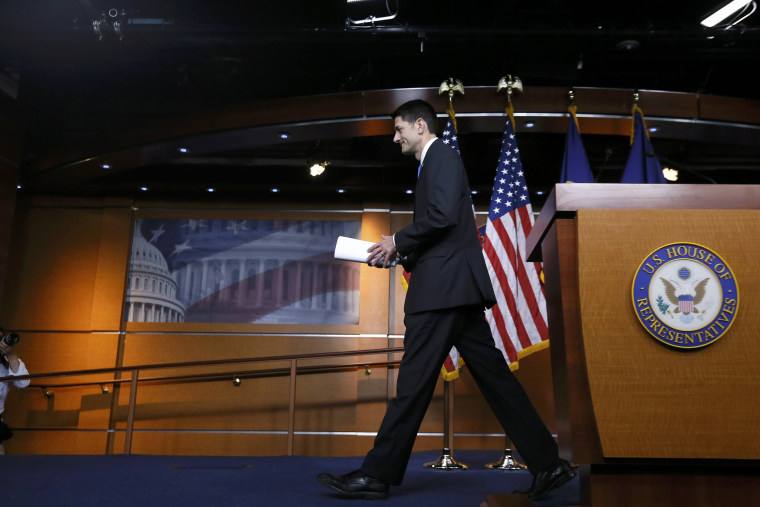I'll confess that I don't quite understand why yesterday's meeting between Donald Trump and House Speaker Paul Ryan generated quite so much attention. The Republican leader has spent months vowing to support his party's presidential nominee, no matter what, and we learned yesterday that Ryan is likely to eventually do exactly what he's said he would do.
Apparently we're supposed to be impressed that Ryan is dragging this out, adding an element of drama to a process with an inevitable end?
Regardless, while there probably wasn't much to be learned from yesterday's high-profile, behind-closed-doors chat, Politico's report on the meeting noted, "[Paul Ryan] even brought charts and slides illustrating the nation's budget woes to help Trump understand the problem he has spent 20 years trying to solve."
As much as I appreciate someone who brings charts and slides to meetings, the assumption -- stated as fact -- that Ryan has "spent 20 years trying to solve" the nation's budget woes is demonstrably incorrect. As regular readers may recall, the Wisconsin congressman voted for George W. Bush's tax cuts and didn't feel the need to pay for them. Then he voted for Bush's extremely expensive Medicare expansion, and didn't feel the need to pay for that, either. He also voted for Bush's wars, and had no qualms whatsoever about adding the costs the national credit card. To top things off, Ryan also voted to bail out Wall Street, and once more, he decided the costs should just be added to the debt.
New York's Jon Chait added yesterday:
During the Bush administration, Ryan distinguished himself from the president by demanding even larger tax cuts -- and, during the fight over privatizing Social Security, advocated a plan that the administration rejected because it would have exploded deficits by too much. Likewise, Ryan has opposed all of the major deficit-reducing legislation during this period -- ending portions of the Bush tax cuts, ending overpayments to private tuition lenders, and enacting the deficit-reducing Affordable Care Act, especially its cost-containment measures. Ryan also voted against the Simpson-Bowles deficit-reduction framework, and torpedoed bipartisan efforts to negotiate a deficit-reduction compromise between the Obama administration and Congress.
So why are we told -- in a news piece, not an op-ed -- that Paul Ryan has "spent 20 years trying to solve" the nation's budget woes? Because the Speaker of the House benefits from an extraordinary reputation that he never actually earned.
I realize this is a lost cause. The political establishment is already convinced, facts be damned, that Paul Ryan is a "wonk" who cares deeply about governing principles and policy details.
Last fall, as the GOP lawmaker was getting promoted to Speaker, the Washington Post's Bob Woodward appeared on Fox News and said of Ryan, "You know, you see him there, he just kind of vibrates reasonableness."
Seriously. That's what he said.
But for those who look past the vibrations and appreciate the congressman's actual record, the gap between Ryan's reputation and reality is enormous.
